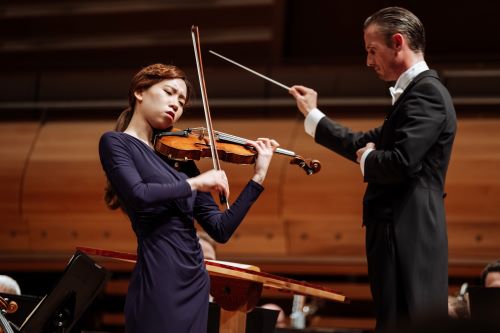 Canada Bartók, Sibelius, Shostakovich: Elli Choi (violin), Christine Lim (violin), Hao Zhou (violin), Orchestre Symphonique de Montréal / Alexander Shelley (conductor). Maison Symphonique, Montréal, 4.6.2019. (LV)
Canada Bartók, Sibelius, Shostakovich: Elli Choi (violin), Christine Lim (violin), Hao Zhou (violin), Orchestre Symphonique de Montréal / Alexander Shelley (conductor). Maison Symphonique, Montréal, 4.6.2019. (LV)

Bartók – Violin Concerto No.2 Sz.112
Sibelius – Violin Concerto Op.47
Shostakovich – Violin Concerto No.1 Op.77
In the first round of the violin finals of the 2019 Concours Musical International de Montréal (CMIM), three brilliant young violinists took on three fearsome concertos. From the United States, Elli Choi (17 years old) played Bartók’s second, and Hao Zhou (22) did the Shostakovich first. And from the US and South Korea, Christine Lim (24) offered Sibelius. Though all three played brilliantly, one was special.
Lim came on stage like a wraith, in a black sheath with white slippers, and a runway model’s remote focus. If it was an exhilarating experience to finally stand in front of the orchestra after so many grueling rounds, she didn’t show it. She started slowly, with a rich variety of color and an impressively wide dynamic range, letting the music tug her along without complaint. When the tuttis broke in she could always be heard. She mastered the art of finishing big phrases ahead of orchestral explosions early and then settling into the beat.
Deep into the music, she was often motionless except for her playing; she was spontaneous, often intensely so — like a Kopatchinskaja without the Moldovan violinist’s choreography or unpredictability. In the slow movement Lim played the little five-note sequences like they were a code, with spider-like intricacy. She knows how to work with silence, and her harmonics were sublime. The last movement seemed to catch her by surprise, but under Alexander Shelley’s watchful eye, she finished like a champion.
After intermission, Hao Zhou took on the Shostakovich with the dedication of a servant and nonstop technique. He heard the vibes from the great bassoon solo after the first movement’s ominous opening and maintained a sense of pace and soul throughout. At every challenge he reminded us of what amazing things can be done with a fiddle. Amidst the orchestra’s marvelous explosions, Zhou put his head down and worked hard without totally taking control of his part of the narrative, until—in the huge and hellish third-movement cadenza — he finally unleashed his inner wild self. He continued with more of the same, and after the final mad dash the audience went crazy.
The evening began with the youngest contestant, Elli Choi, in another murderous challenge, Bartók’s second — lush, beautiful, but not incisive. She smoothed out the opening rhythms and gave it a gentler cast, but didn’t always project through the dense and colorful orchestra parts. Against the harp, she was lyrical when she needed to soar. But in the slow movement, she let herself be seduced by the magic and produced a deeply moving, almost inaudible pianissimo against the strings.
The quality of the three budding virtuosos was matched by that of the Orchestra Symphonique de Montréal, in the home that was built for them. The horn work was superb, the marvelous timpani were also incredibly sensitive, the bassoons were magnificent in all their key passages, and the strings all the way up and down the line were with the soloists on every note.
On the podium, Shelley was unobtrusive and efficient, and immediately got the ensemble back on track during the very few times the soloist and orchestra got separated. No list of the players was available; it looked like there were at least a few substitute musicians, but in any case, they were fantastic. It will be interesting to see who is chosen to lead them when Kent Nagano leaves after next season.
One other thing about the orchestra. It’s got to be backbreaking for them to give everything to every kid. But even when the soloists were flagging at the end, the musicians had their backs.
The Concours has not been without controversy. A local critic complained about the upper end of the age range (contestants must be born between 1990 and 2003), and about the level of experience allowed by CMIM. The writer pointed out that 29-year old Johanna Pichlmair has been in the first violin section of the Bavarian Radio Symphony Orchestra since 2017. For some reason, the article was published the day before Pichlmair was scheduled to play. Perhaps she doesn’t read French.
I asked Kenneth Goldsmith, Professor of Violin at Rice University’s Shepherd School of Music, for his perspective.
‘If she meets all of the criteria as listed, then she is OK. Perhaps many of the contestants have played with major/minor professional orchestras, but have not listed them on their entrance resumes!
‘I think that the age limit should be 25, considering the brilliance of most young players. So many have already started major careers at a young age. I have had high school students who have won the Houston Symphony Competition [for high school players] while only 17 years old — Nurit Pacht in Tchaikovsky, Fia Mancini in Brahms, and Julia Li in Prokofiev — and all three had careers before they were 25. Nurit was playing on tour in Europe while still at Colburn. Mancini was first violin of the Vega Quartet at 24. Julia Li won a position in the first violin section of the Philly Orchestra when she was 24! Goldsmith added, ‘And regardless of age, a chamber music component should be a requirement for all competitions.’
Laurence Vittes
